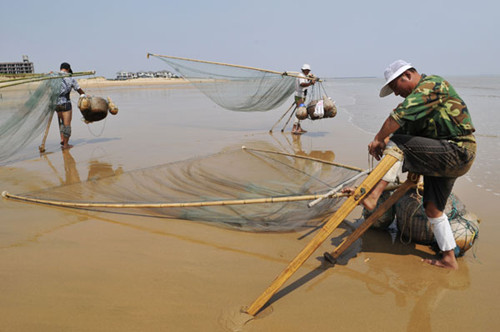
Fishmen prepare to set out to sea at Liangcheng in Rizhao, Shandong province. Chen Weifeng / for China Daily
Deteriorating fish stocks off the coast of East China's Shandong province are forcing fishermen to travel increasingly farther from the shore.
"About a decade ago, we could catch lots of fish after traveling about 90 nautical miles away from land, but now we have to go as far as 130 to 160 nautical miles," said Hou Jiwei, from Wulian county, Shandong province.
Hou has been a fisherman for 16 years.
Around a decade ago, Hou and his colleagues could catch about 5 to 6 metric tons of fish every two weeks, but now they can only net a quarter of that.
According to Special Project 908, an investigation into aquatic resources by the State Oceanic Administration that concluded in October, fishing resources along the coastal waters of the Chinese mainland are in decline.
The investigation found that the winter waters of fish with commercial value are moving closer to the coast and feeding sources for juvenile fish have decreased.
A study by Tianjin Bohai Sea Marine Products Institute in July 2011 also showed that the types of marine products with commercial value decreased from 70 to 10 in recent years.
Working for a private fishery company in Qingdao, Hou said he has spent more time on his boat in recent years because of difficulties in catching fish.
"In the past, we would return to the harbor after fishing in the sea for two weeks. But now, every fishing trip will last at least a month, and sometimes more than two months," he said.
Pollution and land reclamation are the major causes of the depleted fish stocks as they both destroyed the spawning sites of fish stocks, which are generally located in shallow waters, according to Song Weiyan, an aquaculture researcher at Rizhao Polytechnic.
Meanwhile, overfishing and using fishing nets with smaller holes than required, also contribute to depleted fish stocks.
"Other countries, such as South Korea and Japan, generally have strict limits on the size of fishing net holes used by fishing boats. However, the regulation is generally lax in Chinese waters," he said.
Almost every fishing boat is now equipped with fish-detecting devices, which also contributes to rampant overfishing.
"About 10 years ago when you put a bucket into the sea, you could probably catch three fish. Five years ago, you could catch maybe one or two. Now you barely stand a chance of catching any," said Gao Yuefei, owner of a fishing boat in Rizhao.
Meanwhile, with the cost of diesel rising from about 2,000 yuan ($320) per ton to 8,000 yuan per ton over the past 10 years and the wages of workers on the boat also rising, Gao said intensive fishing seems like the only option.
"We will certainly suffer losses if we use the previous methods. If previously we could trawl 100 times, now we need to trawl 120 times to make ends meet," he said.
"Sometimes the fishing boat owners earn less than their employees," he added.

Copyright ©1999-2011 Chinanews.com. All rights reserved.
Reproduction in whole or in part without permission is prohibited.